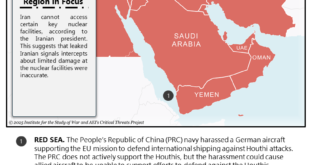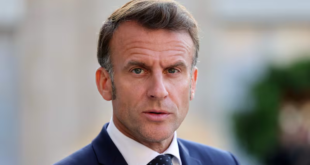US/Russia
Diplomatic row between Moscow and Washington over Russian military build-up in Ukraine and European security more broadly escalated. As U.S. and Russia continued negotiations during month, notably in swiss city Geneva 10 Jan, Moscow continued to demand legally binding guarantees from U.S. and NATO against Ukraine’s accession to NATO and that alliance pull back forces from Eastern Europe. Tensions persisted amid growing Russian military build-up near Ukraine (see Ukraine). U.S. Deputy Sec State Wendy Sherman 18 Jan warned “Russia could launch military attack at any time”; Russian armed forces 18 Jan arrived in Belarus ahead of joint military exercises in country due to run until 20 Feb. U.S. Sec State Antony Blinken 19 Jan said Russia could attack Ukraine “on very short notice” and warned again of tough sanctions; Moscow 19 Jan claimed it had no intention “to attack, strike or invade Ukraine”, while Head of Russian delegation to Vienna talks on military security and arms control Konstantin Gavrilov warned that “West either accepts our proposals or other ways will be found to ensure Russia’s security”. As Russian FM Sergey Lavrov and Blinken 21 Jan met in Geneva, Russia 21 Jan requested foreign NATO troops withdraw from Romania and Bulgaria. U.S. 24 Jan announced 8,500 soldiers in state of alert ready to be deployed on European soil and Biden same day said he would “personally sanction Russian President Putin” if Russia invades Ukraine; Kremlin next day said sanctions would not be “painful”. U.S. 26 Jan formally rejected Russia’s demand to bar Ukraine from NATO and pushed for diplomatic solution “to maintain and defend the sovereignty and territorial integrity of Ukraine”.
Kazakhstan
Localised protests over fuel price turned into nationwide rioting heavily repressed by security forces, killing over 200 people. Protesters 2 Jan flooded streets of petroleum-producing city of Zhanaozen in west after govt doubled fuel prices; protests spread rapidly across country, first in other oil- and mineral-producing regions and then to most regions. In Almaty city, thousands of demonstrators 5 Jan shouted “Old man out” in reference to former President Nursultan Nazarbayev, who led country until 2019 and retained position of head of National Security Council thereafter. In response to unrest, govt 5 Jan resigned and President Tokayev same day removed Nazarbayev from security council position, as well as senior intelligence official Karim Masimov. Protesters 5 Jan took control of Almaty’s airport. Amid unrest, Tokayev 5 Jan requested regional alliance Collective Security Treaty Organization (CSTO) to send forces to guard govt facilities in capital Nur-Sultan; Russia 7 Jan announced regional forces, comprising notably Russian and Armenian troops, retook Almaty’s airport. Tokayev 11 Jan announced beginning of departure of CSTO forces on 13 Jan. Media reports indicated authorities detained up to 12,000 people and officials reported 225 deaths during unrest, with over 2,000 requiring hospital treatment. Last four Russian military transport aircraft with Russian CSTO peacekeepers on board 19 Jan departed from Nur-Sultan.
Kyrgyzstan
Deadly clashes erupted along disputed border with Tajikistan. Clashes along disputed border between Tajikistan’s north-western Sughd province and Kyrgyzstan’s south-western Batken province 27-28 Jan killed two civilians and injured ten people – six servicemen and four civilians – on Tajik side, while 11 were injured on Kyrgyz side; clashes reportedly forced some 1,500 local residents to flee before ceasefire was agreed 28 Jan. Commander of Russia’s Central Military District Alexander Lapin 24 Jan announced Russia will reinforce its military bases in Tajikistan and Kyrgyzstan with new weapons and equipment.
Tajikistan
Deadly clashes erupted along disputed border with Kyrgyzstan. Clashes along disputed border between Tajikistan’s north-western Sughd province and Kyrgyzstan’s south-western Batken province 27-28 Jan killed two civilians and injured ten people – six servicemen and four civilians – on Tajik side, while 11 were injured on Kyrgyz side; clashes reportedly forced some 1,500 local residents to flee before ceasefire was agreed 28 Jan. At virtual Central Asia-India summit, President Rahmon 27 Jan urged Central Asian countries and India to address Afghanistan’s humanitarian crisis. Social media users from 24 Jan called for Russian and Tajik authorities to establish whereabouts of activist Amriddin Alovatshoyev from Mountainous Badakhshan Autonomous Region amid allegations Alovatshoyev may have been detained by authorities. Commander of Russia’s central Military District Alexander Lapin 24 Jan announced Moscow will reinforce its military bases in Tajikistan and Kyrgyzstan with new weapons and equipment.
Syria
Islamic State conducted largest-scale attack since 2019, killing dozens and displacing thousands, amid ongoing insecurity in north west. In one of most significant Islamic State (ISIS) attacks in Syria since group’s territorial de-feat in 2019, ISIS 20 Jan attacked Kurdish-run Ghwayran/al-Sina’a prison in al-Hasakah city in attempt to free ISIS detainees; clashes in following days with Kurdish-led Syrian Democratic Forces (SDF) and U.S. coalition killed some 500 people, including over 370 ISIS fighters, according to SDF; UN 23 Jan estimated that fighting displaced tens of thousands of civilians. SDF 24 Jan said it raided parts of prison forcing militants to surrender. ISIS carried out other attacks throughout month, including alleged rocket attack on military transport bus 3 Jan killing five soldiers and injuring 20 in Badia area. SDF and ISIS 29 Jan engaged in renewed clashes around al-Sina’a prison complex. In Aleppo in north west, series of bombing attacks 13 Jan struck locations in Al-Bab, Afrin and Azaz towns, reportedly killing one civilian and two suspected suicide bombers. Turkey 15 Jan re-sponded by bombing SDF-controlled areas; according to SDF, Turkish bombing of Kobani city killed at least one civilian and injured 11. Shelling 20 Jan killed at least six in Afrin city and Maryamayn town, prompting Turkish forces to shell Kurdish-held areas. In Idlib in north west, March 2020 ceasefire held despite violations. Russian fighter jets carried out air strikes in rebel-held areas in Idlib and ISIS targets in central desert; notably, air raids 13 Jan killed at least 11 ISIS members in Homs and Deir ez-Zor deserts. In Deir ez-Zor, U.S.-led coalition 5 Jan stated that Iranian-backed militias targeted SDF base Green Village housing coalition troops. Syrian state media reported that Israeli missiles 31 Jan targeted outskirts of capital Damascus. Six-month reauthorisation for using Bab al-Hawa border point for cross-border humanitarian assistance 10 Jan went into effect until 10 July. In historical verdict, German court 13 Jan sentenced former Syrian Colonel Anwar Raslan to life in prison for complicity in torture, 27 murders and physical and sexual assault during Syria’s civil war in 2011-2012.
Yemen
Battlefield hostilities escalated as anti-Huthi forces regained Shebwa governorate and Saudi-led coalition intensified bombing after Huthis launched deadly attacks on United Arab Emirates. United Arab Emirates (UAE)-aligned Giants Brigades early month recaptured al-Ain, Bayhan and Usaylan districts in north-western Shebwa governorate, al-Saadi junction connecting Marib and Shebwa governorates, and Harib district in southern Marib governorate; Giants Brigades later gained control of strategic road leading to al-Abdiya district and advanced toward Umm Rish camp in al-Juba district in Marib, although local and regional media late month reported that Giants’ military push was being halted; gains represented Huthis’ first visible territorial losses since their push toward Marib city in Jan 2020. In response to losses, Huthis carried out series of missile and drone attacks on UAE (see United Arab Emirates); Saudi-led coalition reacted by launching air strikes on capital Sanaa; notably, coalition 18 Jan carried out air raids on Sanaa killing at least 20; 21 Jan struck telecoms facility in Hodeida city killing three children and causing four-day nationwide internet outage. Attack 21 Jan targeting prison in Huthi-held Saada city reportedly killed at least 91 and injured over 200; coalition denied responsibility. U.S. President Biden 19 Jan said administration was considering re-designating Huthis as international terrorist organisation. Elsewhere, clashes continued without major shifts in front lines. In south, Taiz city witnessed increased levels of fighting, with govt forces making small advances around Jabal Habashi and Maqbana districts’ border. On political front, tensions between local authorities and tribal movements resurfaced in Hadramawt governorate as tribal conglomeration Hadramawt Inclusive Committee in Wadi Hadramawt area vied for establishment of locally-led military unit outside of ministry of defence chain of command as governor rejected idea. On economic front, currency volatility persisted as Yemeni riyal 30 Jan fell to 1,030 to U.S. dollar, following its appreciation last month, amid fuel shortages and price hikes, notably in Sanaa. Internationally, Iranian FM 10 Jan met Huthi top negotiator and Omani officials; UN Envoy Hans Grundberg 12 Jan briefed UN Security Council, notably highlighted military escalation and concern over militarisation of Hodeida port; 19 Jan met Saudi Vice Minister of Defense and Yemeni FM in Saudi capital Riyadh.
United Arab Emirates
Huthis in Yemen launched largest attack on country to date, killing three people. After United Arab Emirates (UAE)-aligned forces in Yemen seized territory in north-western Shebwa governorate (see Yemen), Huthis carried out attacks on UAE. Huthis 2 Jan seized Emirati vessel in Red Sea and 17 Jan claimed attack targeting industrial facility in Musaffah and extension of airport in capital Abu Dhabi, killing three and injuring six; Huthis 24 Jan targeted Dhafra air base hosting U.S. military in UAE. Attacks come after increasing visibility of Emirati role in Yemen as reports have indicated in recent weeks that UAE has stepped up air operations and support to anti-Huthi groups, despite previous 2019 UAE announcement of withdrawal from conflict. Authorities 31 Jan said they had intercepted missile fired by Huthis from Yemen. Attack came as Israeli President Herzog 30-31 Jan travelled to UAE in first ever visit by Israeli president and discussed security and bilateral relations with Abu Dhabi Crown Prince Sheikh Mohammed bin Zayed Al Nahyan.
 Eurasia Press & News
Eurasia Press & News


